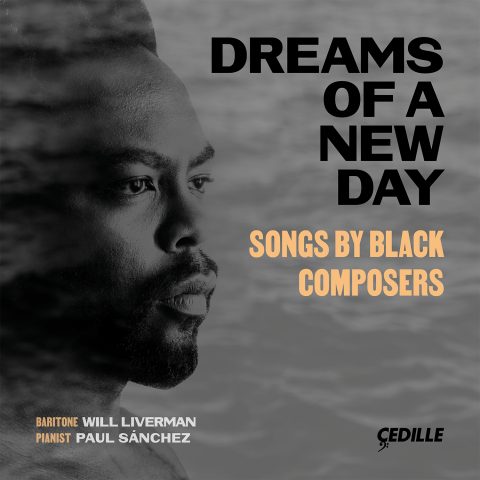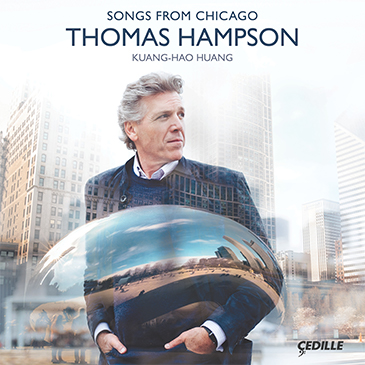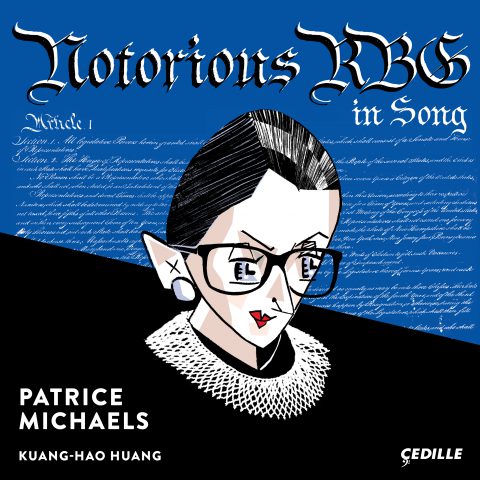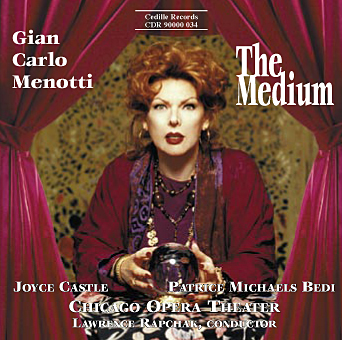| Subtotal | $18.00 |
|---|---|
| Tax | $1.85 |
| Total | $19.85 |
Store
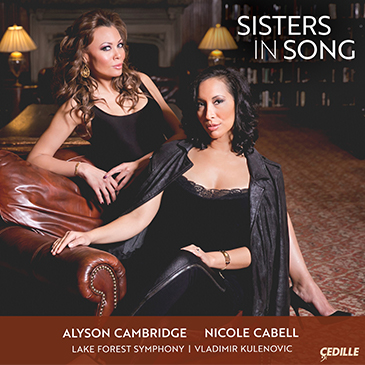
Store
Sisters in Song
Nicole Cabell, Alyson Cambridge, Will Liverman, Lake Forest Symphony, Vladimir Kulenovic
Nicole Cabell and Alyson Cambridge, acclaimed sopranos and close friends, record together for the first time on an album of opera duets by Mozart, Offenbach, Humperdinck, and Delibes and specially commissioned duet arrangements of classical songs, folk tunes, and African-American spirituals.
Cabell, 2005 winner of the BBC Cardiff Singer of the World Competition, is “a faultlessly gleaming soprano” (Financial Times). Cambridge is “radiant, vocally assured . . . and artistically imaginative” (Washington Post), known for her “revelatory, sensual, smoky readings” (Opera News). Joining them in the “Soave sia il vento” trio from Mozart’s Così fan tutte is the “mellow-voiced and charismatic” (New York Times) baritone Will Liverman. They’re accompanied on their Cedille debut by the Lake Forest Symphony under 2015 Sir Georg Solti Conducting Award winner Vladimir Kulenovic.
Inspired by opera stars Kathleen Battle & Jessye Norman’s spirituals recording from the early 1990s, the sopranos describe their album as a “dream project” that’s “uniquely us,” reflecting their multi-ethnic heritages and showcasing pieces that profoundly influenced them both. Composer-arranger Joe Clark, whose music has been performed by Reneé Fleming, Yo-Yo Ma, and jazz singer Kurt Elling, among other classical, jazz, and pop artists, created arrangements expressly for Cabell and Cambridge’s distinctive voices.
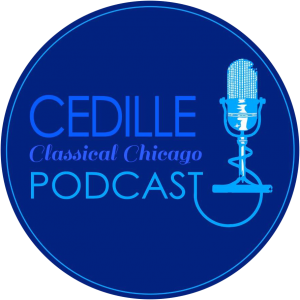
Listen to Steve Robinson’s interview
with Alyson Cambridge on Cedille’s
Classical Chicago Podcast
Preview Excerpts
JACQUES OFFENBACH (1819–1880)
LÉO DELIBES (1836–1891)
ENGELBERT HUMPERDINCK (1854–1921)
WOLFGANG AMADEUS MOZART (1756–1791)
FERNANDO J. OBRADORS (1897–1945), arr. JOE CLARK
GABRIEL FAURÉ (1845–1924), arr. JOE CLARK
TRADITIONAL, arr. JOE CLARK
CHARLES GOUNOD after J.S. BACH, arr. JOE CLARK
SPIRITUALS, arr. JOE CLARK
Artists
5: with Will Liverman, baritone
Program Notes
Download Album BookletSisters in Song
Notes by Jim Kendros
Barcarolle from Les Contes d’Hoffmann
Jacques Offenbach (1819–1880)
Venetian gondoliers, as they rowed their craft throughout the famed waterways of Venice, would serenade their passengers by singing a Barcarolle, a lilting song usually in 3/8 or 6/8 meter. In Act III of Offenbach’s The Tales of Hoffman, titled “Venice,” Hoffman mistakenly believes that the courtesan Giulietta is returning his affections as this famous duet is sung. Giulietta, however, sings this in return for a diamond promised to her by Captain Dapertutto. The magnificent beauty of this duet, familiar to all who hear it, shows nothing of the underlying plot by Giulietta. The wonderful opening suggests the hypnotic nature of Giulietta’s deception.
Belle nuit, ô nuit d’amour
Souris à nos ivresses
Nuit plus douce que le jour
Ô,belle nuit d’amour!
Le temps fuit et sans retour
Emporte nos tendresses
Loin de cet heureux séjour
Le temps fuit sans retour
Zéphyrs embrasés
Versez-nous vos caresses
Zéphyrs embrasés
Donnez-nous vos baisers!
Vos baisers! Vos baisers! Ah!
Belle nuit, ô, nuit d’amour
Souris à nos ivresses
Nuit plus douce que le jour,
Ô, belle nuit d’amour!
Ah! souris à nos ivresses!
Nuit d’amour, ô, nuit d’amour!
Ah! ah! ah! ah! ah! ah! ah! ah! ah! ah!
Lovely night, oh, night of love, smile upon our joys!
Night much sweeter than the day, Oh beautiful night of love!
Time flies by, and carries away our tender caresses for ever!
Time flies far from this happy oasis and does not return
Burning zephyrs, embrace us with your caresses!
Give us your kisses! Your kisses! Your kisses! Ah!
Lovely night, oh, night of love, smile upon our joys!
Night much sweeter than the day, Oh, beautiful night of love!
Ah! Smile upon our joys! Night of love, oh, night of love!
Flower Duet from Lakmé
Léo Delibes (1836–1891)
This famous duet is from Act I as Lakmé and her trusted servant Mallika prepare to bathe in a river, paying homage to the white jasmine, roses, and many other flowers that adorn the riverbank.
Sous le dôme épais
Où le blanc jasmin
À la rose s’assemble
Sur la rive en fleurs,
Riant au matin
Viens, descendons ensemble.
Doucement glissons de son flot charmant
Suivons le courant fuyant
Dans l’onde frémissante
D’une main nonchalante
Viens, gagnons le bord,
Où la source dort et
L’oiseau, l’oiseau chante.
Sous le dôme épais
Où le blanc jasmin,
Ah! descendons
Ensemble!
Sous le dôme épais
Où le blanc jasmin
À la rose s’assemble
Sur la rive en fleurs,
Riant au matin
Viens, descendons ensemble.
Doucement glissons de son flot charmant
Suivons le courant fuyant
Dans l’onde frémissante
D’une main nonchalante
Viens, gagnons le bord,
Où la source dort et
L’oiseau, l’oiseau chante.
Sous le dôme épais
Où le blanc jasmin,
Ah! descendons
Ensemble!
Under the thick dome where the white jasmine
With the roses entwined together
On the river bank covered with flowers laughing in the morning
Let us descend together!
Gently floating on its charming risings,
On the river’s current
On the shining waves,
One hand reaches,
Reaches for the bank,
Where the spring sleeps,
And the bird, the bird sings.
Evening Prayer from Hänsel und Gretel
Engelbert Humperdinck (1854–1921)
This timelessly lyrical and touching homage to peace, safety, and tranquility has enraptured audiences since December 1893.This lovely duet appears in Act II, Scene ii as the Sandman tells the children he loves them and makes them them go to sleep. Gretel reminds Hansel to say their evening prayers as both fall asleep in the forest.
Abends, will ich schlafen gehn,
Vierzehn Engel um mich stehn:
Zwei zu meinen Häupten,
Zwei zu meinen Füßen,
Zwei zu meiner Rechten,
Zwei zu meiner Linken,
Zweie, die mich decken,
Zweie, die mich wecken,
Zweie, die mich weisen,
Zu Himmels-Paradeisen.
When at night I go to sleep, fourteen angels watch do keep
Two my head are guarding, two my feet are guarding
Two are on my right hand, two are on my left hand
Two who warmly cover, two who o’er me hover
Two to whom ‘tis given, to guide my steps to Heaven.
“Ah, guarda sorella” from Così fan tutte, K. 588
W.A. Mozart (1756–1791)
Dorabella and Fiordiligi think sweetly of their fiancés Guglielmo and Ferrando as they revel in plans for their impending weddings.
FIORDILIGI
Ah, guarda, sorella,
Se bocca più bella,
Se petto più nobile
Si può ritrovar.
DORABELLA
Osserva tu un poco,
Che fuoco ha ne’ sguardi!
Se fiamma, se dardi
Non sembran scoccar.
FIORDILIGI
Si vede un sembiante
Guerriero ed amante.
DORABELLA
Si vede una faccia
Che alletta e minaccia.
FIORDILIGI
Io sono felice.
DORABELLA
Felice son io.
FIORDILIGI E DORABELLA
Se questo mio core
Mai cangia desio,
Amore mi faccia
Vivendo penar.
FIORDILIGI
Ah tell me sister, if one could ever find
A nobler face, a sweeter mouth.
DORABELLA
Just look, see what fire is in his eye,
If flames and darts do not seem to flash forth!
FIORDILIGI
This is the face of a soldier and a lover.
DORABELLA
This is a face both charming and alarming.
FIORDILIGI AND DORABELLA
How happy I am! If ever my heart changes its affection,
May love make me live in pain.
“Soave sia il vento” from Così fan tutte, K. 588
W.A. Mozart
This amazingly beautiful trio, sung by the heroines Dorabella and Fiordiligi and philosopher Don Alfonso, is mesmerizing in all aspects of music. The gently lilting rhythms and rapturously elongated melodic phrases suggest a peaceful ocean voyage. The three bid farewell to Guglielmo and Ferrando as the men feign to embark on a sea voyage.
DORABELLA, FIORDILIGI, E DON ALFONSO
Soave sia il vento,
Tranquilla sia l’onda,
Ed ogni elemento
Benigno risponda
Ai nostri [vostri] desir.
DORABELLA, FIORDILIGI, AND DON ALFONSO
On your voyage,
may the winds be gentle
may the waves be calm.
May all the elements be kind
and grant your desires
Del Cabello más Sutil
Fernando Obradors (1897–1945), Arr. Joe Clark
Spanish-born composer Fernando Obradors has given us this mystical song of longing whose beauty touches the soul with noble sentiments.
Del cabello más sutil
Que tienes en tu trenzado
He de hacer una cadena
Para traerte a mi lado.
Una alcarraza en tu casa,
Chiquilla, quisiera ser,
Para besarte en la boca,
Cuando fueras a beber.
Ah!
From that finest hair which thou dost braid
I would craft a chain to draw thee by my side.
A cup within thy house, dear maid, I’d pray become,
Wherein I’d kiss thy mouth as oft as thou drink from …
Ah!
Clair de Lune
Gabriel Fauré (1845–1924), Arr. Joe Clark
Mysterious and yearning, lyrical and exotic, Fauré left us a portrait of the immortal imagery of moonlight with this work for voice and piano. Featuring a haunting central section and a brief return to the mystical opening, Fauré’s song of homage to moonlight is a testament to his gift for creating enchanting works of wonder. Composed in 1887, the text is by the French poet Paul Verlaine (1844–1896), whose same verse also inspired Claude Debussy to compose his famous piano piece of the same name in 1891. Fauré later orchestrated this song as part of his incidental music, Masques et bergamasques, Op. 112.
Votre âme est un paysage choisi
Que vont charmants masques et bergamasques,
Jouant du luth et dansant, et quasi
Tristes sous leurs déguisements fantasques!
Tout en chantant sur le mode mineur
L’amour vainqueur et la vie opportune.
Ils n’ont pas l’air de croire à leur bonheur,
Et leur chanson se mêle au clair de lune,
Au calme clair de lune triste et beau,
Qui fait rêver, les oiseaux dans les arbres,
Et sangloter d’extase les jets d’eau,
Les grands jets d’eau sveltes parmi les marbres.
Your soul is a chosen landscape where charming masqueraders and bergamasquers go
Playing the lute and dancing and almost sad beneath their fantastic disguises.
They all sing in a minor key bout triumphant love and fortunate life,
They do not seem to believe in their fortune, and their song blends with the light of the moon,
In the calm moonlight, sad and beautiful, which has the birds dreaming in the trees.
And the fountains sobbing in ecstasy, the tall fountains, slender amid marble statues.
Black is the Color (Of My True Love’s Hair)
Traditional, Arr. Joe Clark
Although traditionally known as an American Appalachian folk song, there is strong evidence to suggest that this famous song actually originated in Scotland. In many versions, the lyrics highlight mention of the River Clyde, the second longest river in Scotland.
Black is the colour of my true love’s hair.
His face is so soft and wondrous fair,
The prettiest face and the neatest hands,
I love the ground whereon he stands.
I love my love and well he knows,
I love the ground whereon he goes,
And still I hope the time will come
When he and I will be as one.
I walk to the Clyde for to mourn and weep,
But satisfied I ne’er can sleep.
I’ll write him a letter, just a few short lines,
And suffer death ten thousand times.
I kneeled down and I wrote a song,
I wrote it and wrote it long.
At every line I shed a tear
And the last line said “farewell my dear.”
Ave Maria
Johann Sebastian Bach (1685–1750)/Charles Gounod (1818–1893), Arr. Joe Clark
A beloved work for almost any occasion, Ave Maria is the collective creation of two musical geniuses separated by 131 years. The musical underbed comes from the Prelude No. 1 from Book 1 of J.S. Bach’s Well-Tempered Clavier of 1722. Gounod superimposed his own melody over a slightly altered version of Bach’s original prelude. Gounod originally published the piece scored for violin (or cello), piano, and harmonium in 1853 as Méditation sur le premier prélude de piano de S. Bach. Later, Gounod arranged his melody for a vocalist, setting the music to the “Ave Maria” text. This is the version, so cherished today, that Joe Clark has arranged as a duet with orchestral accompaniment.
Ave Maria
Gratia plena
Dominus tecum
Benedicta tu in mulieribus
Et benedictus fructus ventres
Tui Jesus
Sancta Maria, Sancta Maria
Ora pro nobis
Nobis peccatoribus
Nunc et in hora, in hora
Mortis nostrae
Amen
Hail Mary, full of grace, the Lord is with thee.
Blessed art thou among women,
and blessed is the fruit of thy womb, Jesus.
Holy Mary, Mother of God,
pray for us sinners,
now and in the hour of our death. Amen.
There is a Balm in Gilead
Traditional, Arr. Joe Clark
An African-American spiritual, the “balm in Gilead” refers to a spiritual medicine. Taken originally from references in Jeremiah, “Is there no balm in Gilead?,” the lyrics also refer to salvation. The song’s refrain (and the first published reference of it) appeared in a hymn from 1854 titled, “The Sinner’s Cure.”
There is a balm in Gilead
to make the wounded whole,
there is a balm in Gilead
to heal the sin-sick soul.
Sometimes I feel discouraged
and think my work’s in vain,
but then the Holy Spirit
revives my soul again. Refrain
If you cannot preach like Peter,
if you cannot pray like Paul,
you can tell the love of Jesus
and say, “He died for all.”
Oh, What a Beautiful City!
Traditional, Arr. Joe Clark
This profoundly moving African-American spiritual gives voice to the description of New Jerusalem in the book of Revelation 21:11. Emerging victoriously from darkness, the city gates are each crafted with pearls (reference to “pearly gates”) with Angels guarding them. The “Twelve Gates” represent the full spectrum of humanity. The “Beautiful City” stands for Paradise for all humankind.
Oh! What a beautiful city, twelve gates to the city, hallelu.
Three gates in the East, three gates in the West, three gates in the North, three gates in the South. Makin’ it twelve gates to the city, hallelu.
My Lord built that city, said it was just four square. Wanted all of you sinners to meet Him in the air. ‘Cause He built twelve gates to the city, hallelu.
I just want to go to that city. I want to go. Oh, don’t you want to go to that beautiful city?
Twelve gates to the city, hallelu.
Ain’t That Good News
Traditional, arr. Joe Clark
This upbeat spiritual gained special renown when composer and vocalist Sam Cooke (1931–1964), recorded it as the title track of his final album, released in 1964.
I got a crown up in-a that kingdom,
Ain’t-a that good news!
I got a crown up in-a that kingdom,
Ain’t-a that good news!
I’m-a gonna lay down this world,
gonna to shoulder up-a my cross.
Gonna to take it home-a to my Jesus,
Ain’t-a that good news!
I got a robe up in-a that kingdom,
Ain’t-a that good news!
I got a robe up in-a that kingdom,
Ain’t-a that good news!
I’m-a gonna lay down this world,
gonna to shoulder up-a my cross.
Gonna to take it home-a to my Jesus,
Ain’t-a that good news!
I got a Savior in-a that kingdom,
Ain’t-a that good news!
I got a Savior in-a that kingdom,
Ain’t-a that good news!
I’m-a gonna lay down this world,
gonna to shoulder up-a my cross.
Gonna to take it home-a to my Jesus,
Ain’t-a that good news!
Sometimes I Feel Like a Motherless Child
Traditional, Arr. Joe Clark
A stirring African-American spiritual dating from Pre-Civil War years in America, the earliest recorded reference to a performance dates from the 1870s. The use of the word “sometimes” is significant, possibly suggesting hope that the feelings of pain and despair will someday pass.
Sometimes I feel like a motherless child
Sometimes I feel like a motherless child
Sometimes I feel like a motherless child
A long ways from home
A long ways from home
True believer
A long ways from home
Along ways from home
Sometimes I feel like I’m almos’ gone
Sometimes I feel like I’m almos’ gone
Sometimes I feel like I’m almos’ gone
Way up in de heab’nly land
Way up in de heab’nly land
True believer
Way up in de heab’nly land
Way up in de heab’nly land
Sometimes I feel like a motherless child
Sometimes I feel like a motherless child
Sometimes I feel like a motherless child
A long ways from home
There’s praying everywhere
He’s Got the Whole World in His Hands
Traditional, Arr. Joe Clark
A traditional American spiritual/folk song, this work was first published in 1927. The English singer Laurie London (b. 1944) recorded it between 1957–1958 and it became an international best-selling song. Like most popular songs, it has been recorded and performed in countless versions.
He’s got the whole world in His hands
He’s got the whole world in His hands
He’s got the whole world in His hands
He’s got the whole world in His hands
He’s got the fish of the sea in His hands
He’s got the birds of the air in His hands
He’s got the fish of the sea in His hands
He’s got the whole world in His hands
He’s got the gamblin’ man in His hands
He’s got the sinner man in His hands
He’s got the gamblin’ man in His hands
He’s got the whole world in His hands
He’s got the little bitsy baby in His hands
He’s got the little bitsy baby in His hands
He’s got the little bitsy baby in His hands
He’s got the whole world in His hands
He’s got everybody here in His hands
He’s got you and me, brother, in His hands
He’s got everybody here in His hands
He’s got the whole world…
He’s got the whole world in His hands
Album Details
Producer James Ginsburg
Engineer Bill Maylone
Cover Photo Elliot Mandel
Design Bark Design
Recorded January 22–25, 2018 at the James Lumber Center for the Performing Arts, College of Lake County in Grayslake, IL
© 2018 Cedille Records/Cedille Chicago
CDR 90000 181
